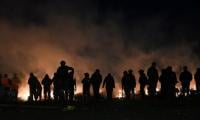Gwadar attack
According to the Inter-Services Public Relations (ISPR), two terrorists were killed by security forces on Sunday which foiled an attack on a military convoy in Gwadar, Balochistan. Reports had said that the military convoy was escorting Chinese workers. In a statement, the Chinese embassy in Pakistan said that a convoy carrying Chinese citizens was attacked near the Gwadar Port, no casualties were suffered on the Chinese side, and Chinese citizens in Pakistan are reminded to "be vigilant and take preventive measures against security risks". The attack was claimed by the outlawed Balochistan Liberation Army (BLA). This wave of terrorism, especially in Balochistan and Khyber Pakhtunkhwa, is quite worrying. Pakistan’s security forces have in recent months reiterated their resolve to take on any terror chalenge without any ifs and buts. Addressing the people of Khyber Pakhtunkhwa and Balochistan at the Azadi Parade at Pakistan Military Academy (PMA) in Kakul on the eve of Independence Day, Army Chief General Asim Munir said that the armed forces have been fighting against terrorism and proxies for over two decades. The army chief had also only recently made unequivocal statements against this surge in terror, stating that there is no option for talks with terrorists if they continue their violent ways.
In May this year, Jamaat-e-Islami (JI) chief Sirajul Haq narrowly escaped a suicide attack when his convoy was targeted in Zhob, Balochistan. In recent months, even cities like Karachi and Islamabad have witnessed attacks. A report released by the Pakistan Institute for Conflict and Security Studies (PICSS) says that in the first half of 2023, Pakistan has witnessed a steady and alarming rise in terror and suicide attacks as a total of 271 attacks took place occurred during the first half of the current year, claiming 389 lives and injuring 656 others. These are alarming numbers for a country that had successfully eliminated terrorism from its soil. After the fall of Kabul, terrorism reared its head again in the country, something that had been feared here when the Afghan Taliban had taken over Afghanistan.
Many experts have pointed out that the TTP and its affiliate groups have made inroads in Balochistan also. The country’s intelligence and security apparatus too had revealed this year that contacts between the TTP and militant Baloch organizations and foreign intelligence agencies have been proven. It is important that these alliances and networks be broken through intelligence operations and on-ground operations. That the TTP is operating from Afghan soil under the eyes of the Afghan Taliban government is also something that needs more focus. It is important to remember that an attack on any foreign workers in the country is an attack not just on their lives but also on Pakistan’s collective livelihood. China has been helping Pakistan’s development through its investment in infrastructure and other projects. We already face a debilitating economy and cannot afford such terror. The TTP and the current terror challenge will need an all-of-country approach to be dealt with. The National Action Plan is essential at this time. Together with Nacta, which must also be given new life, this is the only way to deal with the multiple terrorism, militancy, and insurgency challenges. The federal government, provincial governments, security forces and our police apparatus must find a concrete way to fight this. One encouraging sign is how both the civilian and military sides of the state are united and adamant in not giving any leeway to terrorism and terrorist outfits like the TPP. This is the way to go forward. Meanwhile, security and political solutions need to be considered simultaneously so we can make our federation stronger and more united – because more resentments within areas that are deemed peripheral to the centre will only lead to more radicalization of the young.
-
 'Bridgerton' Season 4: Showrunner Talks About Violet's Steamy Romance
'Bridgerton' Season 4: Showrunner Talks About Violet's Steamy Romance -
 John Tesh Recalls ‘uncomfortable’ Backlash Over ’70s Romance With Oprah Winfrey
John Tesh Recalls ‘uncomfortable’ Backlash Over ’70s Romance With Oprah Winfrey -
 Meghan Markle, Prince Harry Problem Was Not ‘work’ During Time With Royals
Meghan Markle, Prince Harry Problem Was Not ‘work’ During Time With Royals -
 Meta Strikes Multi-billion-dollar AI Chip Deal With Google: Will The New Collaboration Pay Off?
Meta Strikes Multi-billion-dollar AI Chip Deal With Google: Will The New Collaboration Pay Off? -
 Gracie Abrams Breaks Silence After Losing 2026 BRIT Award
Gracie Abrams Breaks Silence After Losing 2026 BRIT Award -
 Deon Cole Takes Swipe At Nicki Minaj In Mock Prayer During NAACP Image Awards Monologue
Deon Cole Takes Swipe At Nicki Minaj In Mock Prayer During NAACP Image Awards Monologue -
 Jennifer Garner Reveals The Actress Who 'carried Through Things'
Jennifer Garner Reveals The Actress Who 'carried Through Things' -
 Shamed Andrew ‘awful’ Time As Trade Envoy Is Laid Bare By Insider
Shamed Andrew ‘awful’ Time As Trade Envoy Is Laid Bare By Insider -
 Belgium Seizes Suspected Russian Shadow Fleet Tanker
Belgium Seizes Suspected Russian Shadow Fleet Tanker -
 Liza Minelli Makes Bombshell Claim About Late Mother Judy Garland’s Struggle With Drugs
Liza Minelli Makes Bombshell Claim About Late Mother Judy Garland’s Struggle With Drugs -
 Shipping Giant Maersk Halts Suez Canal, Bab El-Mandeb Sailings Amid Escalating Conflict
Shipping Giant Maersk Halts Suez Canal, Bab El-Mandeb Sailings Amid Escalating Conflict -
 Matthew McCoughaney Reveals One 'gift' He Achieved With Losing Nearly 50 Pounds
Matthew McCoughaney Reveals One 'gift' He Achieved With Losing Nearly 50 Pounds -
 'Scream 7' Breaks Box Office Record Of Slasher Franchise: 'We Are Grateful'
'Scream 7' Breaks Box Office Record Of Slasher Franchise: 'We Are Grateful' -
 Bolivian Military Plane Crash Death Toll Rises To 20
Bolivian Military Plane Crash Death Toll Rises To 20 -
 'Sinners' Star Blasts Major Media Company For 2026 BAFTAs Incident
'Sinners' Star Blasts Major Media Company For 2026 BAFTAs Incident -
 Inside Scooter Braun, Sydney Sweeney's Plans To Settle Down, Have A Baby
Inside Scooter Braun, Sydney Sweeney's Plans To Settle Down, Have A Baby



